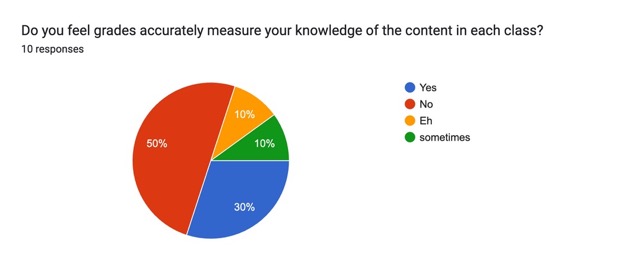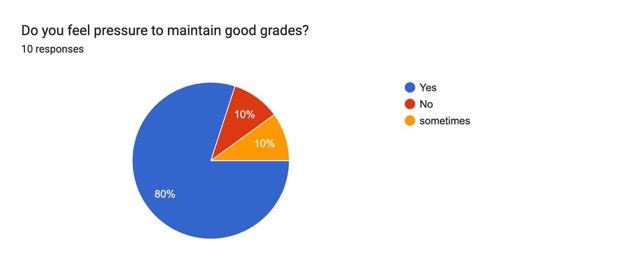How Letter Grades Cultivate a Toxic Environment for Students
A deep dive into the grading system and how it cultivates toxic environments for students, looking through the lens of a local middle school.

Important note from Elliot: This is an opinion piece based on research, anecdotal evidence, personal experience, and a survey with an extremely small sample size that should not be seen as accurate. Still, this article brings up some important ideas and conversation starters around grades, the school system, and grade pressure culture. It is a piece of work I continue to be proud of a year after adapting this for my blog. Still, it should be noted that this is a deeply argumentative and opinionated post and that you should do your own research before coming to any conclusions. (note dated Aug. 29, 2024)
💡This article has a brief mention of self harm.
At first glance, everything is going well at my local middle school. Most students achieve highly academically and come from very well-off backgrounds with parents who are engaged in their student’s learning. But if you ask students that go to this school, they'll tell you a different story.
There’s a constant gloomy feeling that wasn't there before, and it’s increasingly becoming a worse environment to be in.
If you step into this middle school as a student, you'll notice the constant use of derogatory language and hateful speech by students right away. This feels out of place considering how progressive the area the school is in. You wouldn’t expect this behavior from such highly-achieving and well-off students. Grade level wise, this behavior started at the beginning of middle school; Before that, it was very uncommon. For quite a bit of time, I’ve been trying to find out what caused this large cultural shift in the environment entering middle school.
Originally, I thought homework could be part of the problem. But I could never quite get my finger on what was exactly wrong with it. I felt like there was some sort of underlying issue that I couldn’t quite grasp. So I tried to look at the bigger picture: the connection between my dislike of homework and the toxic environment of my school.
The grading system.
Finally, I realized that the grading system had been the underlying issue this whole time. Students were only so stressed because their grades were used as a measurement of themselves as students, and they were getting pressure from their parents to get straight A’s and do the very best. Incomplete homework gets a grade of zero, even if it's mostly done, and that grade reflects badly on students. No wonder the students are always talking about their grades or test scores and even cheating on schoolwork with each other so they can get a higher test score. I wondered whether the flaws of the grading policy was connected to this toxic behavior and student mental health
The standard grading system is straightforward and easy to understand. When you get a letter grade, you know exactly what it means. If you get an A, you did good. If you get an F, you failed. Easy and efficient. An article I found from THNK noted:
At first, grades seem like a textbook example of efficiency improvement, allowing the differences between students to be quantified and allowing teachers to understand more students in less amount of time.
This would be great, but using a letter to represent a student’s mastery of a subject just doesn’t work out. Letter grades are one-dimensional. As one teacher said,
“If at the end of the grading period when one of my students got a C in reading, I wasn’t sure if it was his reading fluency, his inability to understand cause and effect, or if he wasn’t constructing the sentences in an accurate way.” (Strobel)
The current grading system fails to work as a tool that's supposed to show where students are succeeding and where they are struggling.
💡 Most students who took my anonymous survey don't think grades fully measure their knowlege of each subject.

The current grading system is also quite punishing to students, as it expects perfection and doesn't allow much room for mistakes. For example, if a student gets a low score on a test, perhaps because they’ve been going through a rough time, or because they’ve missed a couple of days when the teacher explained the concept, it permanently counts against them on their grade, creating unnecessary stress and causing the student to strive for perfection instead of focusing on what's important: learning.
Grades push students to strive for perfection instead of focusing on what really matters: learning.
This is hypocritical as we often hear about how students should learn from their mistakes, and how schools are the place to make mistakes. For example, my local school's handbook states:
“Let students make mistakes and fail. Some of life’s best lessons and “teachable moments” come from mistakes and failures.”
If this is the case and mistakes should be “teachable moments”, then punishing our students for mistakes in the form of low scores and zeros doesn't make sense.
On its own, the grading system isn't enough to create such a large toxic environment, because, really, it's just a tool. A flawed one sure, but still just a tool. And since everyone would use it as just a tool, it wouldn’t really matter, especially once people noticed how flawed it was.
But because of the emphasis we put on grades, it becomes a much larger issue.
When we mix in parents who want their children to succeed, as I hope all parents do, this is especially true. Often parents want their children to succeed in school, they do so by pressuring their children. This extra pressure causes all the aforementioned issues. Of course, when students are under such pressure, they act differently. Some students’ mental health gets worse, and others may lash out by being hateful, creating a toxic environment for everyone else as well. This is backed up by Madeline Levine, a practicing psychologist and children’s therapist, who noticed a pattern, specifically when a fifteen-year-old girl from a loving and financially comfortable family came to her with the word “empty” carved into her arm. Conversations with educators and clinicians across the country as well as diligent research confirmed her suspicions that competitive pressures in the school system made these kids so unhappy. In her book, The Price of Privilege, she references her own experiences as a therapist as well as other research. (Friedman; Levine)
The instant feedback provided by grades is co-dependent with parental pressure.
💡8 / 10 students who took my anonymous survey say they feel pressured to maintain good grades.

So we need to find a way to break this this co-dependency between grades and parental pressure. Of course, we could try to stop this on the side of parental pressure, but this seems unattainable because the school can't control what parents are gonna do. To me, the only reasonable solution is to fix the problem with the grading system. If grades were not flawed but instead made a useful tool, there would be a lot less of a problem.
That presents the idea of what a world without traditional letter grades looks like. Of course, we would still need some other tool to measure a student’s strengths, weaknesses, accomplishments, and learning, but it would have to fix the flaws of the current system. After thinking about this for a while, I’ve made a theoretical system that, with some tweaks of course, would address most of the problems I'm aware current system has.
When creating this system, I wanted to:
- celebrate student achievement and improvement
- address a student's strengths and weaknesses
- capture a student as a complete individual
Student progress would be measured in a very different way based on improvement, effort, and other such things. Students would still have to try their best, but the final result wouldn’t solely be determined by tests and quizzes. With this system, students wouldn’t be punished if they were struggling or if they made a mistake. Furthermore, student achievement wouldn’t only be measured by the result, but by the process of getting there.
A “score” sheet for each student would have different categories such as planning skills, follow-through, teamwork, understanding material, timeliness, etc., and would be scored on a scale similar to as follows:
Needs Work ➡️ Working on it ➡️ Improving ➡️ Good
These score sheets would only be available about four times a year, when the student and the teacher would review it together, highlighting what good work the student has done and what the student should focus on working on. I believe this would remove the pressure of standard letter grades as well as force people to not be so concerned about grades anymore, due to them not having constant access. Instead, this would finally allow grades to be used as the tool it should've been.

While working towards a better grading system, we will have to work in baby steps. The easiest first step to take is to realize grades are supposed to be a tool and aren’t the most important thing in life. That mindset alone will help calm the toxic mentality of grading. The next thing I would propose is more lenient homework policies as well as policies that forgive zeros and low scores. If we continue making similar baby steps over time with the intention to try to reach a better grading system, we will eventually get there.
However, if you want to make a change right now, here's what you can do.
Students and parents - have a conversation about using grades as a tool rather than striving for perfection. Talk about the importance of mental health, and how grades alone do not determine everything about a student’s future. Discuss carving out times in the day for the student to pursue their chosen hobbies and activities.
Teachers - try to be more forgiving on your grading policies and frequently leave useful notes in the “notes” section of the grade book. Have ways for students to easily fix their mistakes and learn from them. If you are a less harsh grader but give more specific comments on improvement, it will allow your students more wiggle room to learn.
Everyone else - Advocate for better grading policies at your local school district by getting in touch with your school board.
By reimagining what grades look like, we open the door to a better learning experience for everyone.
Works Cited
“3 Reasons Grades Are Bad for Education.” THNK, 29 June 2021, www.thnk.org/blog/3-reasons-grades-bad-education/.
Friedman, Hilary Levey. “Children and Competitiveness.” Oxford Bibliographies, www.oxfordbibliographies.com/display/document/obo-9780199791231/obo-9780199791231-0061.xml. Accessed 4 June 2023.
“REDACTED's School Handbook” Google Docs, 2023, link redacted. Quotes from this source have been slightly edited for privacy reasons.
Levine, Madeline. “The Price of Privilege.” Madeline Levine, Ph.D., madelinelevine.com/books/the-price-of-privilege/. Accessed 4 June 2023.
Strobel, Kim. “Five Problems with the Traditional Grading System and Why Standards-Based Grading Is a Better Alternative.” Strobel Education , 30 Mar. 2023, strobeleducation.com/five-problems-with-the-traditional-grading-system/.



